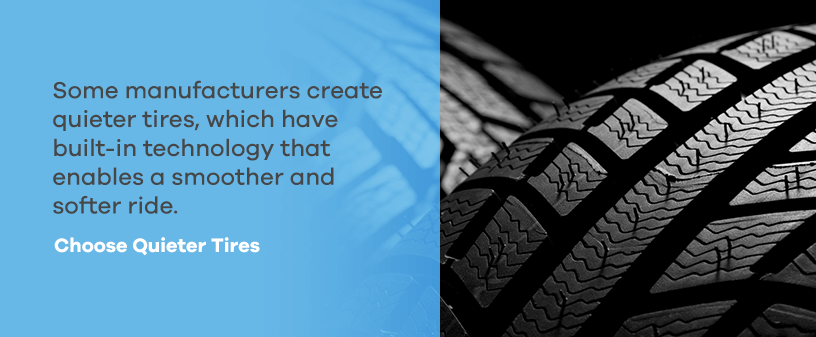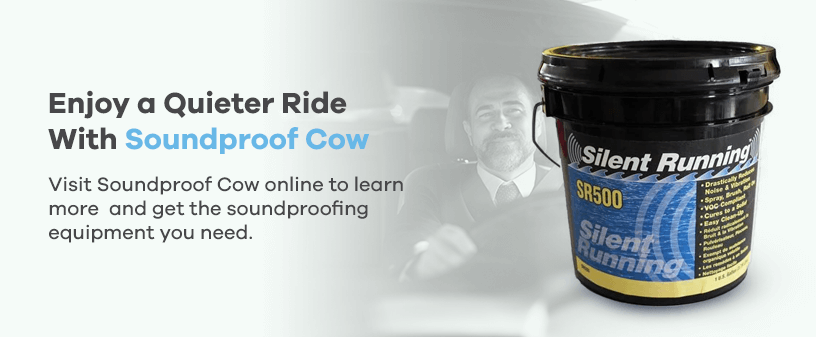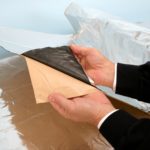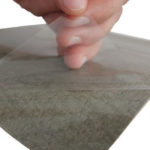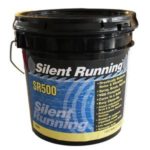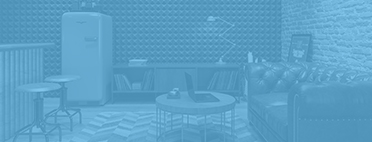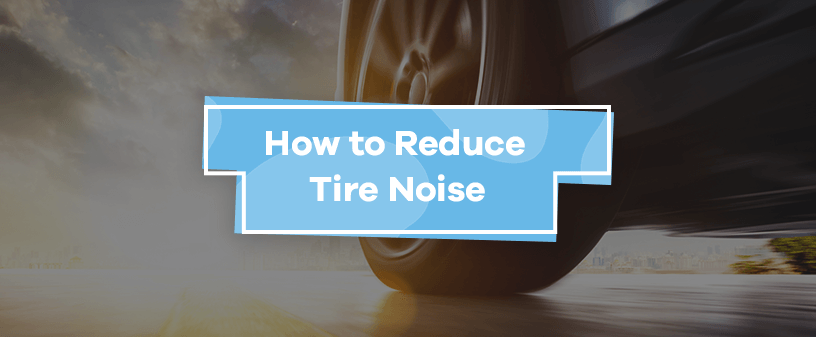
You’re on the road with miles to go, and crank up the volume to listen to that new podcast you’ve found or get lost in your playlist until you reach your destination — only to find you can barely hear over the sound of your car’s tires rolling against the asphalt. Whether you’re a full-time semi-truck driver or a morning commuter, this scenario might sound a little familiar.
Though some noise is natural — especially in large vehicles or on rough roads — excessive tire road noise can be bothersome and distracting.
Table of Contents:
What Causes Loud Tire Noises
How to Reduce Road Noise From Tires
– Choose Quieter Tires
– Service Tires Regularly
– Soundproof Your Doors and Floors
What Causes Loud Tire Noises?
Every tire, road, vehicle and driver is unique. Loud tires are rarely the result of a single source — instead, they come from multiple factors. For example, gravel-covered roads and worn tires will be a bumpy, loud ride for all. Perfectly paved asphalt highways are no match for an underinflated tire, which will thud all the way to your next exit. Some tire noise is normal, especially if you have wide tires that expose more rubber to the road.
To understand how to quiet road noise from tires, you first need to identify the source — or sources — of the sound.
Normal Wear and Tear
Normal wear and tear is a common cause of excessive tire noise. As you use your tires, the treads wear down. The smoother your tire becomes, the less traction it provides and the louder it will be. You can test your tire tread by placing a penny inside the ridges — if the treads are level with Abraham Lincoln’s head, the tread is too low. Instead of replacing each tire as the tread wears thin, you can have your tires retreaded, which is usually more affordable than a full replacement and extends your tires’ life.
Your tires are probably overdue for maintenance if you notice other signs, like vibrations or cracks. Depending on the type of tire and vehicle you drive, you should replace your tires every six to 10 years. The larger and more durable your tire — like semi-truck tires — the longer you can usually wait between replacements if maintaining them correctly. At the minimum, you should have your tires rotated every 5,000 to 8,000 miles for optimal performance.
Underinflation
When a tire doesn’t have enough air, it morphs and bends each time it rolls against the road. This movement causes a thudding sound. Tire underinflation will also cause your treads to wear down a lot faster, contributing to the noise. Keeping your tires filled to the correct level will help quiet noisy tires, improve road performance and longevity and save you nearly 11 cents per gallon of fuel.
Foreign Debris Lodged in the Ridges
It’s easy for small items, like rocks, sticks and trash, to get stuck between the treads and ridges of your tires. When this happens, that object repeatedly rolls against the ground as you drive, which can cause annoying, repetitive sounds. Fortunately, this is usually a pretty quick fix — pull the debris out of your tire at the next gas station or truck stop. If the item has become too deeply lodged, you might have to use lubricant and a non-metal stick to pry the object out gently. Be careful not to be too aggressive, or you risk puncturing your tire.
How to Reduce Road Noise From Tires
Once you identify the source or sources of tire noise, you can figure out how to quiet noisy tires and get the peaceful drive you want.
1. Choose Quieter Tires
Some manufacturers create quieter tires, which have built-in technology that enables a smoother and softer ride. These tires are usually narrower than others and have smaller voids and tread blocks. Some types of tires have a design that makes them naturally louder than others, like off-road tires with extra tread. When choosing a quiet tire, make sure you’re still getting the right type for your vehicle and driving conditions.
2. Service Tires Regularly
Regular tire maintenance is essential for reducing noise and staying safe on the road. Routinely do the following to keep on top of your tire maintenance.
- Self-inspections: Always check your tires before and after a long trip to note any lodged debris, cracks, worn tread or low pressure. Regularly examining them will help you notice sooner when your tires are ready for professional servicing or require immediate attention.
- Maintenance checkups: Some newer cars have a built-in service alert feature that activates when it’s time for you to take your vehicle into the shop. Otherwise, aim for regular maintenance checkups at least once per year, or when your car is acting abnormally. During these checkups, the mechanic will inspect your tires for wear, tear and damage, including the tread level and pressure.
- Retread, repair and replace: To keep tires as quiet and efficient as possible, remember to retread, repair and replace them as needed. Don’t forget about your spare — it will also need routine inspections and servicing!
Shop Car Soundproofing materials
3. Soundproof Your Doors and Floors
Sometimes, your tires will be noisy despite your best efforts, and you may not be able to eliminate the sound. That’s where soundproofing comes in. By soundproofing your car doors and the floor, you can reduce how much noise travels inside.
Sound from the road might travel into your car through openings — like cracks, gaps and open windows — or maybe you can hear it through thin floorboards and walls. By soundproofing these vulnerable areas, you can help block the sound and keep it from filtering inside. Some soundproofing supplies you can use include the following.
- RoadBlockR Sound-Deadening Material: We engineered RoadBlockR with noisy cars in mind! This easy-to-apply sound-deadening sheet applies to the metal surfaces in your car and reduces sound transmission in the cabin.
- Vibra Block® Sound-Deadening Material: Vibra Block® is an industrial-strength sound-deadening polymer that is a cinch to size and stick to any part of your car that lets noise in. You can get Vibra Block® in sheets, strips and pads.
- Silent Running: Silent Running is a soundproofing coating you apply like paint. It helps reduce sound transmission and vibrations, making it a straightforward solution for those who frequent rougher roads.
Enjoy a Quieter Ride With Soundproof Cow
If loud tires and vibrations make your car rides uncomfortable, a little tire maintenance and soundproofing might do the trick. Visit Soundproof Cow online to learn more about how to reduce tire noise and other bothersome sounds in your car, home or business, and get the soundproofing equipment you need. Need help soundproofing your space? Give us a call at 866-949-9269, and our experts will help you figure out the best soundproofing strategy for you.


